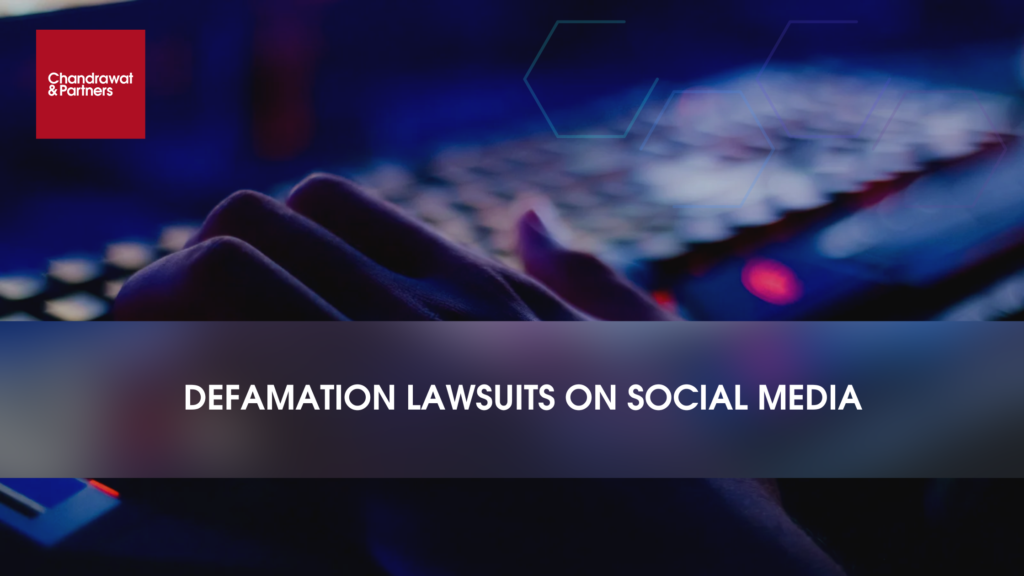Share :
RISE OF DEFAMATION CASES IN THE AGE OF SOCIAL MEDIA
Social media platforms have played a major role in the increase of defamation lawsuits in India. The ease, affordability and anonymity of internet access have led to an increase in defamation cases. Social media platforms like Facebook & Twitter amplify statements, allowing them to reach vast audiences quickly, which could result in reputational harm and legal battles. In India, defamation is addressed under section 499 of the Indian Penal Code (“IPC”) and it can be categorised as either libel (written form) or slander (spoken words).
Judicial Pronouncements
In the case of Hill v. Church of Scientology of Toronto, the Manning and Church of Scientology held a press conference to publicly announce criminal contempt proceedings against a Crown attorney. This case highlighted the long-lasting impact of defamatory statements and the difficulty in correcting the record. Further, the case of Subramanian Swami v. Union of India is the landmark judgement given by Supreme Court of India which challenged the constitutional validity of criminal defamation. The court upheld the constitutional validity of criminal defamation stating that the right to reputation is protected under the Article 21 of the Constitution of India.
The advent of social media has led to a new advent of defamation, often referred to as cyber defamation. The SMC Pneumatics (India) Pvt. Ltd. v. Jogesh Kwatra is the first case of cyber defamation in India where a disgruntled employee sent defamatory emails about the company and its managing director, leading to the Delhi High Court granting ex-parte ed interim injunction restraining the defendant from defaming the plaintiff.
Right to Reputation
The right to reputation has been considered as a fundamental right covered under the ambit of Article 21 of the Constitution of India. In the case of Mohammad Abdullah Khan v. Prakash K, supreme court observed that the right to reputation cannot be sacrificed at the altar of the right to free speech, emphasizing the importance of maintaining balance between the two rights.
BALANCING FREEDOM OF SPEECH & REPUTATION
Freedom of speech and the right to protect one’s reputation are two fundamental pillars of a democratic society. The battle between protecting freedom of speech and safeguarding individual’s reputation is a delicate balance that the legal systems around the world struggle to maintain. The tussle becomes especially apparent in the age of social media, where information, whether authentic or fake, can rapidly spread to its users. The Indian legal standards for defamation are designed to protect individuals from false statements that could harm their reputations. However, these laws are obligated to respect the fundamental right to freedom of speech and expression as mandated under Article 19(1)(a) of the Constitution of India. To balance these rights, the Indian judicial landscape has developed certain legal principles and tests that determine defamation.
The elements of defamation are:
- False Statement: The plaintiff or the appellant is required to prove that the statement made against them is false. Truth is generally an absolute defence against defamation.
- Identification: The statement must be about plaintiff and must be identifiable by others.
- Publication: The statement must be published, that is, it must be communicated to at least one person other than the plaintiff.
- Harm: The statement must have caused harm to the plaintiff’s reputation.
The tests through which defamation can be determined in digital era are:
- Actual Malice Standard: In some jurisdictions, the plaintiff is required to prove that the defamatory statement was made with actual malice, meaning the defendant knew the statement was false or acted with reckless disregard for the truth.
- Negligence: For private individuals, the standard is often whether the defendant acted negligently in failing to ascertain the truth of the statement.
- Privilege: Some statements are protected by privileges, such as those made during judicial proceedings or in legislative assemblies.
DEFAMATION LAW SUITS AND ONLINE HARASSMENT
The defamation lawsuits and online harassment are closely related, as the false statements made online can have severe consequences on individual’s lives and mental well-being. When false information spreads about an individual online, it can lead to reputational damage, loss of employment opportunities, and even privacy and safety concerns.
To address the connection between defamation lawsuits and online harassment, it is important to raise awareness about the potential harm caused by false statements online. Promoting digital literacy, responsible behaviour, and fostering a culture of empathy and respect are essential in combating online harassment and protecting individual’s wellbeing in the digital age.
ROLE OF SOCIAL MEDIA PLATFORM IN DEFAMATION CASES
The rise of social media has complicated the legal landscape, as defamatory statements can spread rapidly and widely. These platforms can exponentially amplify the reach of defamatory statements, potentially causing significant harm to an individual’s reputation. The anonymity provided by social media further complicates the identification of individuals responsible for posting defamatory content, posing challenges for legal redress.
Additionally, the global nature of social media creates jurisdictional challenges, as the parties involved may be located in different countries with varying defamation laws. This has led to the requirement for clearer international legal frameworks to address cross-border defamation. Courts are increasingly considering the contextual framework in which statements are made, the public interest involved, and the role of algorithms in amplifying content.
HOW WE CAN HELP ?
- Our lawyers specialize in defamation law and help in understanding the nuances of social media defamation cases. They assess the strength of cases, gather evidence and relevant information and provide the best suitable legal remedy.
- Our team assists in protecting an individual’s reputation by monitoring and addressing defamatory content online, including requesting removal of content, issuing cease and discontinue letters.
- Our professionals assist in managing an individual’s reputation by implementing strategies to counteract the negative impact of the defamation.
For more information or queries, please email us at
enquiries@chandrawatpartners.com




